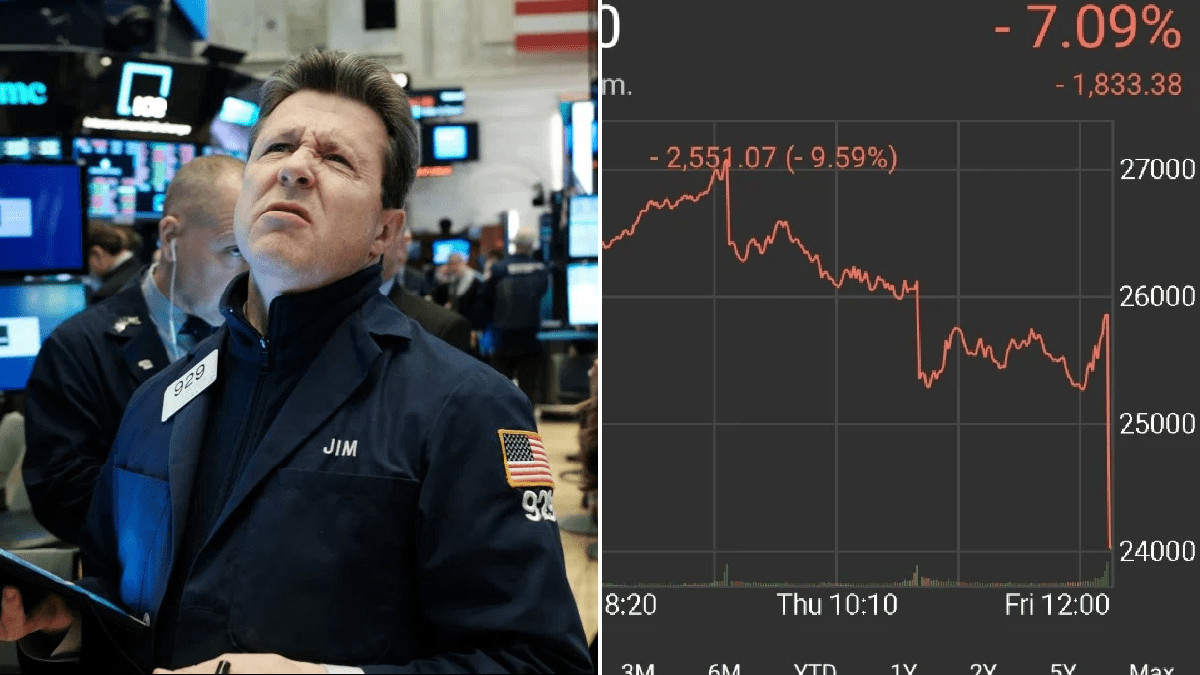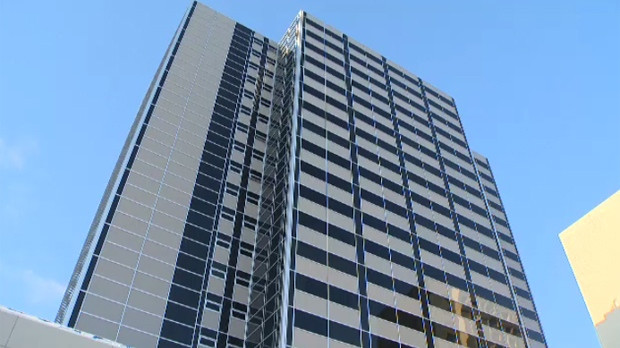Stocks tumbled Friday on worries the U.S. economy could be cracking under the weight of high interest rates meant to whip inflation.
A report showing hiring by U.S. employers slowed last month by much more than economists expected sent fear through markets, with both stocks and bond yields dropping sharply. It followed a batch of weaker-than-expected reports on the economy from a day earlier, including worsening U.S. manufacturing activity, which has been one of the areas hurt most by high interest rates.
It was just a couple of days ago that U.S. stock indexes jumped to their best day in months after Federal Reserve chair Jerome Powell gave the clearest indication yet that inflation has slowed enough for rate cuts to begin in September.
Now, worries are rising that the Fed may have kept its main interest rate at a two-decade high for too long. A rate cut would make it easier for U.S. households and companies to borrow money and boost the economy, but it could take months to a year for the full effects to filter through.
"The Fed is seizing defeat from the jaws of victory," said Brian Jacobsen, chief economist at Annex Wealth Management. "Economic momentum has slowed so much that a rate cut in September will be too little and too late."
Jacobsen said the U.S. central bank will have to "do something bigger" than the traditional cut of a quarter of a percentage point in order to avert a recession.
Traders are now betting on a nearly three-in-four chance that the Fed will cut its main interest rate by half a percentage point in September, according to data from CME Group. That's even though Powell said Wednesday that such a deep reduction is "not something we're thinking about right now."
Of course, the U.S. economy is still growing, and a recession is far from a certainty. The Fed has been clear about the tightrope it's walking since it started hiking rates sharply in March 2022: Being too aggressive would choke the economy, but going too soft would give inflation more oxygen and hurt everyone.
While refusing to claim victory on either the jobs or the inflation front on Wednesday, before the discouraging economic reports hit, Powell said Fed officials "have a lot of room to respond if we were to see weakness" in the job market after hiking its main rate so high.
"Yes, the economy is weakening, but I am not convinced there is enough evidence that the data so far is a death knell for the economy," said Nathan Thooft, senior portfolio manager at Manulife Investment Management.
U.S. stocks had already appeared to be headed for losses on Friday before the disappointing jobs report thudded onto Wall Street.
Several big technology companies turned in underwhelming profit reports. Amazon, for example, fell 9.2 per cent after reporting weaker revenue than expected for the latest quarter.
Intel dropped even more — 26.7 per cent and on pace for its worst day in 50 years — after the chip company's profit for the latest quarter fell well short of forecasts. It also suspended its dividend payment and said it expects to lose money in the third quarter, when analysts were forecasting a profit.
A Slowing Job Market Triggers Recession Fears
The July jobs report marked a considerable decline from the average of 215,000 jobs added monthly over the past year, and fell short of economists' expectations of around 175,000 new positions. Additionally, the unemployment rate rose to 4.3%, reaching its highest point since October 2021.
Wall Street and investors are concerned about this jobs report for several reasons. The sharp drop in job growth suggests that the economy may be cooling faster than anticipated, potentially signaling the risk of a recession.
The weaker-than-expected jobs report has triggered the "Sahm Rule," a historically accurate recession indicator closely monitored by the Federal Reserve. It is triggered “when the three-month moving average of the national unemployment rate rises by 0.50 percentage points or more relative to its low during the previous 12 months,” according to the Fed.
The data has raised questions about whether the U.S. central bank has been too slow in reducing interest rates, potentially risking a "hard landing" for the economy.
The Market Reacts to Job Growth Fears
The jobs report has led to increased expectations of more aggressive rate cuts by the Fed, with some investors now anticipating a half-percentage point reduction in September, a significant shift from previous predictions.
The market reaction to the employment situation was notably negative, with stocks tumbling sharply. The Dow Jones Industrial Average, at one point, fell nearly 1,000 points, while the Nasdaq dropped over 10%, entering correction territory.
The market downturn reflects growing concerns about economic stability and the potential for a recession, despite the overall low unemployment rate and continued job growth, albeit at a slower pace.
AI Exuberance and Other Factors Weighing on Markets
Beyond the jobs report, other factors also contributed to the market's stress. High interest rates—intended to combat inflation—are now raising concerns about their impact on economic growth. Investors are worried that the U.S. economy could be cracking under the weight of these high rates, leading to a potential recession.
The tech sector, in particular, has been hit hard, with richly valued tech firms experiencing significant losses. Global market reactions, including a tech-driven retreat in Asian shares, have added to the overall market volatility.
The impact of overexuberance in artificial intelligence on current stock market trends has been significant, drawing parallels to the dot-com bubble of the late 1990s. Investors' enthusiasm for AI has propelled U.S. equity markets to multiple all-time highs in early 2024, driven by the potential to revolutionize various industries and boost productivity growth. This excitement has led to substantial investments in AI-related stocks, which have been at the forefront of market gains over the past year.
However, this exuberance has also raised concerns about overvaluation. Many AI stocks are now considered to be, at best, fairly valued and, at worst, overvalued, prompting some analysts to caution that the AI stock trade may be running out of steam.
The current situation is reminiscent of the dot-com bubble, where excessive speculation and sky-high valuations eventually led to a market correction. Investors are now grappling with the realization that the billions spent on building AI may not yield immediate financial returns, contributing to market volatility and uncertainty.
In addition to AI-related concerns, other factors are placing stress on the stock market. Geopolitical tensions, such as ongoing conflicts in the Middle East and Ukraine, have added to investor anxiety. These conflicts can disrupt global supply chains and economic stability, further exacerbating market volatility.
Additionally, the uncertainty surrounding the upcoming U.S. presidential general election has created a cautious environment for investors, as potential policy changes could impact economic and market conditions.
The Potential Impact on the Job Market
Stock market crashes can lead to broader economic downturns and significant disruptions in the job market. Companies, anticipating or experiencing reduced revenues, may resort to layoffs and other cost-cutting measures, contributing to rising unemployment and economic instability. This historical pattern underscores the interconnectedness of financial markets, business confidence and employment levels.
Stock market crashes erode consumer and business confidence, leading to reduced spending and investment. This decline in economic activity can trigger a recession, as witnessed in the Wall Street Crash of 1929, preceding the Great Depression, and the 2008 financial crisis.
During periods of market turmoil, companies frequently become concerned about their financial stability and future economic conditions. As a result, they may implement cost-cutting measures, including layoffs, to preserve cash and maintain profitability.
The Great Recession led to widespread job losses across various sectors, as businesses responded to the sharp economic downturn. The pattern of downsizing amid economic headwinds is a common response to declining revenues and the need to streamline operations.
The impact on the job market can be severe, with rising unemployment rates and increased competition for available jobs. Workers may face prolonged periods of joblessness, and recent graduates or entry-level professionals may find it particularly challenging to secure employment. The reduction in consumer spending power further exacerbates the economic slowdown, creating a vicious cycle of reduced demand and continued job losses.
Economic uncertainty and potential recession fears could lead companies to freeze hiring or cut back on workforce expansion plans. As a result, workers may face tougher conditions in securing new jobs, and those currently employed might experience increased job insecurity. The overall economic environment suggests a need for caution and preparedness for potential financial instability.
Looking Ahead
The stock market's recent volatility underscores the interconnectedness of the global economy. With rising inflation and interest rates, a potential recession on the horizon, and geopolitical tensions simmering, investors and businesses alike are facing a period of uncertainty. It remains to be seen whether the Fed's actions will be enough to avert a recession, and what the ultimate impact will be on the job market and global economic growth.
As the situation unfolds, it's crucial for investors to stay informed and make informed decisions based on their individual risk tolerance and financial goals. This period of volatility highlights the importance of diversification and long-term investment strategies, as well as a focus on high-quality companies with strong fundamentals.

















